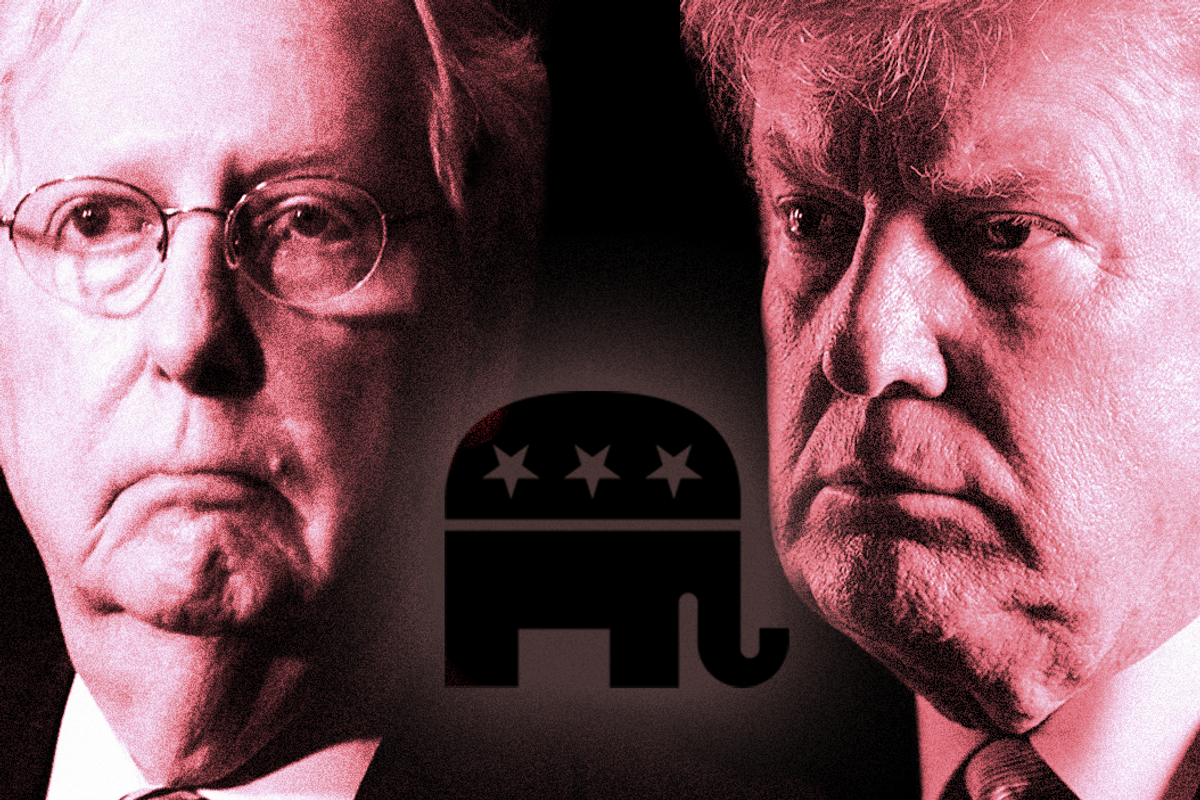"There's no question, none — that President Trump is practically and morally responsible for provoking" the January 6 Capitol building riot. That attack was the "foreseeable consequence of the crescendo of false statements, conspiracy theories and reckless hyperbole, which the defeated president kept shouting into the largest megaphone on the Earth."
So said Kentucky's Mitch McConnell, US Senate Republican leader since 2006, just after voting last Saturday to acquit the president of high crimes and misdemeanors following Trump's Senate impeachment trial.
On Tuesday, Trump punched back. "Mitch is a dour, sullen, and unsmiling political hack, and if Republican Senators are going to stay with him, they will not win again." On Thursday, the pro-Trump chairman of Kentucky's Republican Party called on McConnell to resign as Republican leader.
The battle is joined.
Trump remains a powerful political force. Even in defeat, he won 74 million votes for president last year, the second highest total of any candidate in US history. Even after two impeachments, some 75 percent of Republican voters said in a recent poll that they want him to continue to "play a prominent role in the Republican Party," and 87 percent say he should be allowed to "hold elected office in the future." Trump may not have Twitter, but he has many other available megaphones in social media and cable TV. He will not be silenced.
What does this mean for the party? The GOP has descended into an all-out civil war that will rage in plain sight for years to come. McConnell and his allies have weapons too. They can help direct large amounts of campaign cash toward the establishment-friendly Republican candidates they believe stand the best chance of beating Democrats in the 2022 midterms, and if the party regains its Senate majority, McConnell will again control the legislative agenda. Trump, in turn, will barnstorm across the country in support of insurgent candidates who distinguish themselves mainly by their fealty to him and their commitment to continuous culture war combat.
The first GOP civil war battle will be waged later this year in Virginia's gubernatorial election, where leading Republican candidates include a long-time state legislator, a business executive, and a pro-Trump firebrand who spoke at the January 6 rally that triggered the Capitol insurrection and has publicly hailed the rioters as "patriots."
Then we move to the 2022 midterm elections. Republicans need a net gain of five seats to win back a majority in the House of Representatives and of just one to reclaim the Senate. In state after state, Trump insurgents will face off with establishment Republicans.
No major American political party has faced an internal fight of this magnitude and consequence in more than a century.
Trump's legal troubles will up the stakes. He'll likely face a series of legal challenges in coming months over his business affairs, charges that he tried to overturn the election result in particular states, and possibly criminal responsibility for the Capitol rampage. That story will remain in the news all year as more than 140 of the rioters now face federal charges and more will likely follow. Trump will use Republican responses to these courtroom dramas as litmus tests of loyalty to his vision of the party's future.
He may also threaten to sink the GOP by forming a third party. In a poll conducted last month, 64 percent of registered Republican voters said they would "likely" follow Trump if he does, and 32 percent said they'd be "very likely."
Will there be a winner in this civil war? The first clue will come in the 2022 midterms, when the GOP candidates who survive primary battles face Republican, Democratic, and independent voters. The results of those races will tell us what kind of candidate will carry the Republican banner forward into the 2024 presidential election and what kind of party the GOP will become.



















